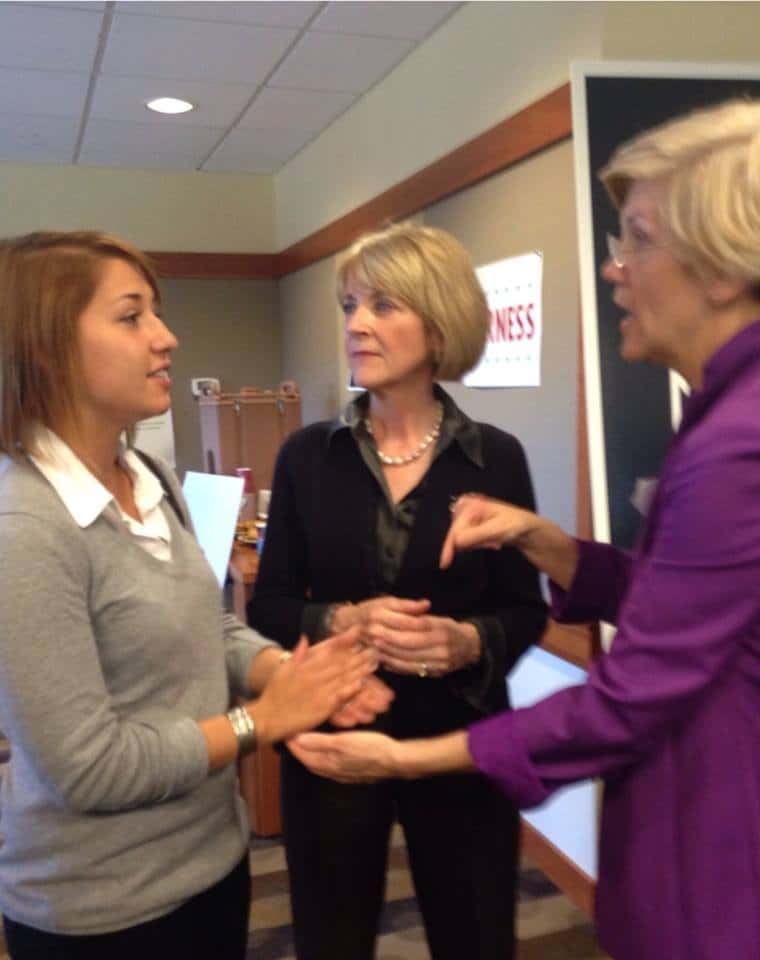YesOn4 in Massachusetts

by Ellen Bravo
People who will benefit from earned sick time in Massachusetts – ballot initiative 4 – are greeting activists enthusiastically at the door. They’re folks like Timothy Chouinard, a factory worker in Falls River who told them, “I knew you guys were going to stop. I’m the typical person that you guys are working for right here.” He went on to describe losing $80-$100 when he was out sick one day, and how his wife, who works at the same factory, was docked two days’ pay when their boys were ill. “I support this then,” he said. “Hell, yeah.”
 Others who will benefit are the canvassers themselves, including Gabrielle Monteiro, pictured here with Senators Elizabeth Warren and gubernatorial candidate Martha Coakley. She remembers what it was like coming from the ER with what turned out to be pneumonia, only to be told by her boss at a local Laundromat that she’d better get in to work that night.
Others who will benefit are the canvassers themselves, including Gabrielle Monteiro, pictured here with Senators Elizabeth Warren and gubernatorial candidate Martha Coakley. She remembers what it was like coming from the ER with what turned out to be pneumonia, only to be told by her boss at a local Laundromat that she’d better get in to work that night.
“I knew for certain that if I did not go into work, I would be at risk of losing my job,” says Gabrielle. “Employers should understand the effect that these situations cause both in a community as well as the success of business. I was not happy to be there, and the customers certainly could tell. I am also sure that a lot of paying customers lost respect for the lack of responsibility the business took to ensure top-quality hospitality.
Gabrielle’s organization, Coalition for Social Justice, is one of several dozen involved in the phenomenal grassroots effort to reach voters. They’re organizations with names like NUBE (Neighbors United for a Better East Boston,) MA Alliance of HUD Tenants, and Neighbor to Neighbor Massachusetts. Along with labor unions, faith leaders, women’s groups and more, they’re talking to hundreds of thousands of people with a very simple message: Earned sick time is good for families, businesses and the economy. And Massachusetts voters agree.
A recent report by the Massachusetts Budget and Policy Center elaborates on the economic effects when workers can earn paid sick days: allowing families to meet basic needs; increasing long-term employment and earnings prospects; and preventing unnecessary health care expenses.
Support from Health Care Providers and Business Leaders
Not surprising, then, to learn today that four leading health care providers in the state – Boston Children’s Hospital, Partners HealthCare, Boston Medical Center, and Steward Health Care – have all endorsed the initiative.
“Massachusetts is the home of some of the most comprehensive, advanced medical care in the world,” said Kate Walsh, President and CEO of Boston Medical Center. “Unfortunately, many people in our state cannot access this care for themselves or a family member because they cannot afford to take time off from work. Question 4 will eliminate this barrier and give the people of Massachusetts the ability to get the medical care they need, when they need it.”
A leading business association in the state has also taken a strong position in favor. Phil Edmundson chairs the Alliance for Business Leadership, a non-partisan network of more than 170 CEOs, business leaders, entrepreneurs and investors committed to building an economy that supports long-term growth and prosperity for all. Here’s how he explained their support: “As businesspeople, we know that earned sick time reduces employee turnover, increases productivity, and helps businesses’ bottom line.”
What’s At Stake
A YesOn4 vote will be a huge boost to the nearly one million workers in the Bay State who don’t earn a single paid sick day now. It will help millions more who can’t now use their time to care for a sick family member, don’t get paid if they’re out only one day, or get disciplined for using the time they’ve earned.
But a win on the earned sick time ballot initiative will also help campaigns laying the groundwork for statewide legislative wins in 2015 – places like Vermont, Maryland, Minnesota, New Jersey, Oregon and Washington. And a string of wins like that will bring us near a tipping point for a national standard.
That’s a very big YES for all of us.